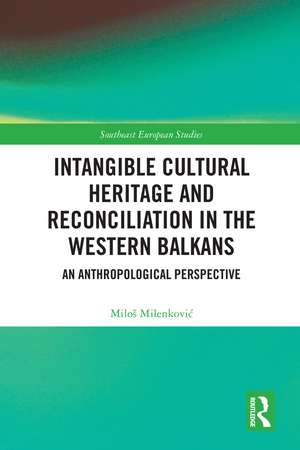Intangible Cultural Heritage and Reconciliation in the Western Balkans: An Anthropological Perspective: Southeast European Studies
Autor Miloš Milenkovićen Limba Engleză Hardback – aug 2024
Din seria Southeast European Studies
-
 Preț: 312.22 lei
Preț: 312.22 lei -
 Preț: 489.26 lei
Preț: 489.26 lei - 9%
 Preț: 1039.71 lei
Preț: 1039.71 lei - 18%
 Preț: 1000.27 lei
Preț: 1000.27 lei - 18%
 Preț: 994.95 lei
Preț: 994.95 lei - 12%
 Preț: 312.43 lei
Preț: 312.43 lei - 30%
 Preț: 849.05 lei
Preț: 849.05 lei -
 Preț: 383.68 lei
Preț: 383.68 lei - 16%
 Preț: 241.15 lei
Preț: 241.15 lei -
 Preț: 351.66 lei
Preț: 351.66 lei -
 Preț: 383.12 lei
Preț: 383.12 lei -
 Preț: 379.77 lei
Preț: 379.77 lei -
 Preț: 384.48 lei
Preț: 384.48 lei - 18%
 Preț: 1006.92 lei
Preț: 1006.92 lei - 28%
 Preț: 821.29 lei
Preț: 821.29 lei -
 Preț: 381.98 lei
Preț: 381.98 lei -
 Preț: 385.84 lei
Preț: 385.84 lei -
 Preț: 383.68 lei
Preț: 383.68 lei -
 Preț: 411.42 lei
Preț: 411.42 lei -
 Preț: 386.18 lei
Preț: 386.18 lei - 26%
 Preț: 764.69 lei
Preț: 764.69 lei -
 Preț: 384.27 lei
Preț: 384.27 lei - 26%
 Preț: 764.20 lei
Preț: 764.20 lei -
 Preț: 361.13 lei
Preț: 361.13 lei - 18%
 Preț: 999.19 lei
Preț: 999.19 lei -
 Preț: 382.54 lei
Preț: 382.54 lei - 16%
 Preț: 241.15 lei
Preț: 241.15 lei - 16%
 Preț: 241.15 lei
Preț: 241.15 lei - 31%
 Preț: 767.67 lei
Preț: 767.67 lei -
 Preț: 469.34 lei
Preț: 469.34 lei - 18%
 Preț: 1000.45 lei
Preț: 1000.45 lei
Preț: 948.21 lei
Preț vechi: 1156.35 lei
-18% Nou
Puncte Express: 1422
Preț estimativ în valută:
181.44€ • 189.95$ • 150.13£
181.44€ • 189.95$ • 150.13£
Carte tipărită la comandă
Livrare economică 07-21 aprilie
Preluare comenzi: 021 569.72.76
Specificații
ISBN-13: 9781032732466
ISBN-10: 1032732466
Pagini: 246
Dimensiuni: 156 x 234 mm
Greutate: 0.52 kg
Ediția:1
Editura: Taylor & Francis
Colecția Routledge
Seria Southeast European Studies
Locul publicării:Oxford, United Kingdom
ISBN-10: 1032732466
Pagini: 246
Dimensiuni: 156 x 234 mm
Greutate: 0.52 kg
Ediția:1
Editura: Taylor & Francis
Colecția Routledge
Seria Southeast European Studies
Locul publicării:Oxford, United Kingdom
Public țintă
Postgraduate and Undergraduate AdvancedCuprins
Acknowledgements
1 Introduction: Anthropological aims, ethnological means
Part I Approaching ICH after post-cultural Anthropology
2 Heritage denialism: Anthropology and critical heritage studies against ICH safeguarding
3 Post-cultural anthropology: The source of contemporary heritage denialism
Part II Ethnologists as expert-bureaucrats: Lessons from the Western Balkans
4 Beyond anthropology versus ethnology in former Yugoslavia
5 Fieldwork: Method and context
6 The ethnic versus territorial attribution of minority, contested, and shared intangible heritage
7 Professional expertise versus the politicization of knowledge in ICH arena
8 Heritage disciplines within ICH reconciliation and development framework in the Western Balkans
Part III Ne nuntium necare
Conclusion: Putting anthropology back to heritage
Name Index
Subject Index
1 Introduction: Anthropological aims, ethnological means
Part I Approaching ICH after post-cultural Anthropology
2 Heritage denialism: Anthropology and critical heritage studies against ICH safeguarding
3 Post-cultural anthropology: The source of contemporary heritage denialism
Part II Ethnologists as expert-bureaucrats: Lessons from the Western Balkans
4 Beyond anthropology versus ethnology in former Yugoslavia
5 Fieldwork: Method and context
6 The ethnic versus territorial attribution of minority, contested, and shared intangible heritage
7 Professional expertise versus the politicization of knowledge in ICH arena
8 Heritage disciplines within ICH reconciliation and development framework in the Western Balkans
Part III Ne nuntium necare
Conclusion: Putting anthropology back to heritage
Name Index
Subject Index
Recenzii
“Miloš Milenković’s book dares us to think positively about the structures for the safeguarding of intangible cultural heritage, and the work these structures and intangible heritage more generally can do for society. In doing so, he unpacks the destructive possibilities of critique for critique’s sake and points to a brighter landscape where critique and critical thinking come together not to destroy, but to build; where heritage is not (only) a tool of manipulation, but also a (potential) tool of resilience and peace.”
- Lucas Lixinski, Professor at the Faculty of Law & Justice, UNSW Sydney
“This is a timely book and a brave one, attempting to overcome the contrast, and occasional conflict, between ethnology and anthropology in Eastern Europe. Drawing on extensive fieldwork from the Western Balkans and engagement with policymakers and NGOs, Milenković argues that the two sister disciplines are complementary rather than in competition. His refreshing and original view on intangible cultural heritage has the potential to enrich both disciplines, and could have an impact on policy and ideology at this time of neo-nationalism and polarization. Although the book has a regional focus, the message is relevant for comparative analysis and anthropological theory, and it deserves a wide readership.”
- Thomas Hylland Eriksen, University of Oslo
- Lucas Lixinski, Professor at the Faculty of Law & Justice, UNSW Sydney
“This is a timely book and a brave one, attempting to overcome the contrast, and occasional conflict, between ethnology and anthropology in Eastern Europe. Drawing on extensive fieldwork from the Western Balkans and engagement with policymakers and NGOs, Milenković argues that the two sister disciplines are complementary rather than in competition. His refreshing and original view on intangible cultural heritage has the potential to enrich both disciplines, and could have an impact on policy and ideology at this time of neo-nationalism and polarization. Although the book has a regional focus, the message is relevant for comparative analysis and anthropological theory, and it deserves a wide readership.”
- Thomas Hylland Eriksen, University of Oslo
Notă biografică
Miloš Milenković is Professor at the Department of Ethnology and Anthropology, Faculty of Philosophy, University of Belgrade.
Descriere
This book considers the sensitive heritage elements linked to the very issue of the origins of nations. Beliefs, rituals, and traditional knowledge are examples of intangible cultural heritage (ICH), which communities globally regard as the core of their cultural identity.
